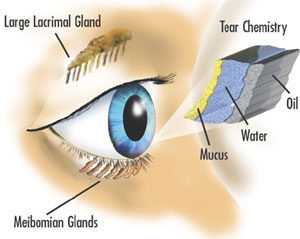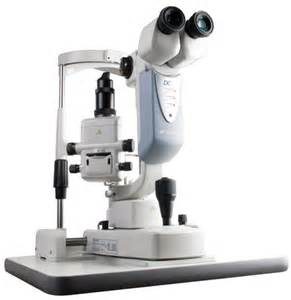Dry eye is a very common condition, affecting up to 40% of the population at some time in their lives. It is particularly common in those over 40 and is more common in women than men.
At Chipping Norton Opticians you can see us for a dry eye assessment if you have long term symptoms or as part of the NHS Minor Eye Conditions Service if of more recent onset.
What are the symptoms of dry eye?
- gritty feeling eyes
- irritation
- burning
- itching
- blurred vision
- eyes sticking together at night
- and surprisingly, watery eyes – the excessive watering is caused by the dryness. The eye naturally produces more water to try and combat the dryness; however this often leads to over tearing. This can be a problem for most people on very cold windy days, but those suffering from dry eye, experience it more often.
What are the causes of dry eye?
Dry eye is caused from a problem with your tears. The tears are made up of three layers, a mucus layer, an aqueous layer and a lipid layer. If you are deficient in any one of these it can cause the quality of the tears to be inadequate and cause the above symptoms.
Eyelid conditions called blepharitis and meibomian gland dysfunction can cause dry eye. They are conditions that both affect the tear quality.

What is done at your dry eye assessment?
First of all we will go over your symptoms in detail, which may give clues to the cause of the dry eye. It could be related to a general health issue or an environmental factor. We will use a microscope to examine the tear film on the front of the eye, the eyelids and the cornea in detail. This will involve instilling a yellow drop in the eye which is completely painless, allowing us to measure the quality of the tears and also how quickly the tears evaporate from the eye. We can then decide if you are simply not producing enough tears or whether the tears are evaporating too quickly due to an insufficient lipid layer. Following all of this we can develop a treatment plan.

How can dry eye be treated?
Dry eye can be treated in a number of ways:
Ocular lubricant drops are the most commonly advised solution. There are a multitude of products on the market with different active ingredients and acting in different ways, so we are able to advise on specific types and regimens for your condition.
If you have blepharitis or meibomian gland dysfunction, we are able to advise you on lid hygiene products to manage these conditions. Usually getting to the underlying problem is the best way to treat the dry eye.
For more severe dry eye cases, Chris is one of the few optometrists in the UK to be trained to fit punctual plugs which offer a more permanent solution to dry eyes, considerably reducing or eliminating the need for lubricating drops. We will examine you to see if you are suitable to try punctual plugs.

